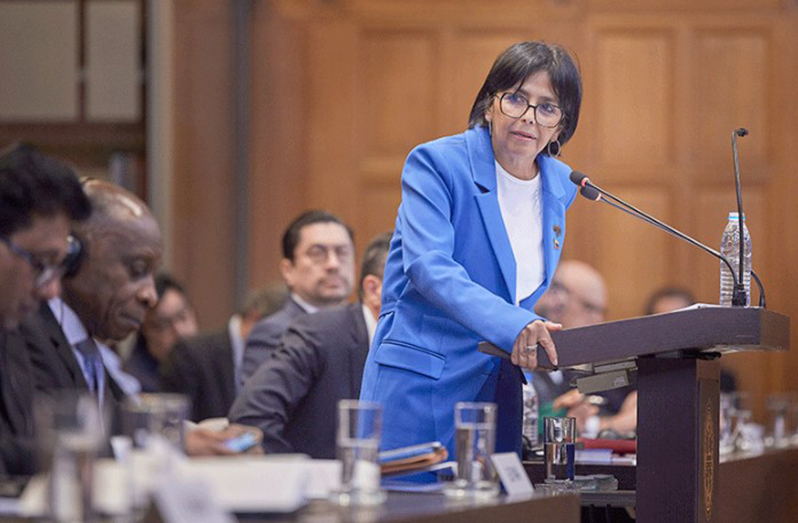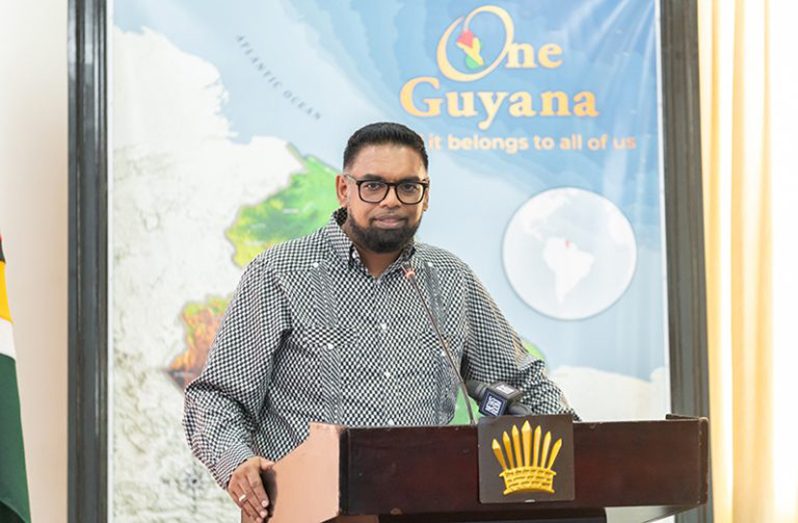–President Ali says in response to comments by Venezuela’s Vice-President
IN a strategic move to prioritise peace over provocation, President, Dr. Irfaan Ali, has chosen a diplomatic path amid the escalating tensions with Venezuela, and will not be engaging in a tit-for-tat exchange with the Bolivarian Republic’s Vice-President, Delcy Rodriguez.
During a press conference at the Arthur Chung Conference Centre, President Ali affirmed his commitment to protecting Guyana’s sovereignty and territorial integrity rather than engaging in an exchange of words, which he labelled as “ignorance.”
The ongoing border controversy between the two South American nations reached a critical juncture during a recent hearing at the International Court of Justice (ICJ).
Venezuela’s Vice President, Delcy Rodriguez, accused Guyana of attempting to prevent a consultative referendum scheduled for December 3.
President Ali’s measured response comes in the wake of Rodriguez’s submissions, where she focused on Guyana’s relationships with the United Nations, United States, and ExxonMobil.
Rodriguez accused Guyana of being the aggressor and promoting xenophobia, claims that President Ali dismissed as unnecessary distractions from the core issue of territorial integrity.
Contrary to Venezuela’s allegations, Guyana has consistently maintained a stance against xenophobia, highlighting the importance of treating migrants, including those fleeing Venezuela, with empathy and dignity.
Guyana’s government has demonstrated a proactive approach to assisting migrants from Venezuela, numbering approximately 40,000.
The nation had also undertaken substantial efforts to protect these vulnerable populations, and provide them with necessities such as access to health and education services.
President Ali, in response to queries about why he doesn’t respond directly to the Venezuelan Vice President of Venezuela, stated: “It is not necessary to match ignorance with ignorance.”

He stressed the need to prioritise peace and maintain a brotherly relationship, asserting the importance of safeguarding Guyana’s sovereignty and territorial integrity.
Rodriguez, during her submission to the ICJ, played an eight-seconds excerpt from President Ali’s speech at the launch of the Essequibo Chamber of Commerce and Industry’s annual Agro and Trade Expo.
Rodriguez sought to emphasise President Ali’s commitment to not ceding any territory to Venezuela, framing it within the context of the ongoing territorial issue.
However, Rodriguez’s selective quoting potentially distorts President Ali’s original message, which highlighted the government’s commitment to representing the people of Essequibo amid the border controversy.
In 1897, Venezuela and Great Britain concluded an agreement — the Treaty of Washington — by which they agreed to submit the issue regarding the location of their land boundary to binding arbitration before a tribunal of eminent jurists, including the heads of the judiciary of the United States and Great Britain.
The parties — Britain and Venezuela — agreed in that Treaty to accept the Tribunal’s Award as a full, perfect and final settlement of the boundary issue between the parties.
The genesis of the controversy traces back to the 1899 Arbitral Award, a landmark decision that delineated the land boundary between British Guiana (now Guyana) and Venezuela.
However, despite the historic arbitration, tensions have persisted, with Venezuela repeatedly challenging the validity of the award.
In 2018, Guyana took a decisive step by approaching the ICJ, seeking affirmation of the 1899 Arbitral Award’s legitimacy.
Venezuela, taking a defiant stance, initially claimed the ICJ lacked jurisdiction, a contention flatly rejected by the international court in a crucial ruling in December 2020. The door was thus opened for the ICJ to delve into the substantive case’s merits.
Recent developments have heightened the geopolitical situation, as Venezuela, through its National Electoral Council, unveiled plans for a “Consultative Referendum” on December 3, 2023.
Guyana contends that this move is a thinly veiled attempt by Venezuela to gather support for abandoning the ongoing ICJ proceedings, and unilaterally assert control over the Essequibo region.
In response, Guyana swiftly approached the ICJ, seeking urgent provisional measures to prevent any actions by Venezuela that could jeopardise the status quo until the court reaches a final verdict on the matter.
The ICJ is expected to rule on Guyana’s request for provisional measures to prevent Venezuela from proceeding with its planned referendum on the Essequibo. Meanwhile, the substantive case, highlighting the historical context and the 1899 Arbitral Award, remains before the court.




.jpg)










